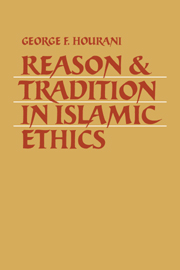Book contents
- Frontmatter
- Contents
- Preface
- Foreword by Michael Marmura
- Conventions
- Titles and locations of the original articles
- Introduction
- 1 Islamic theology and Muslim philosophy
- 2 Ethics in classical Islam: a conspectus
- 3 Ethical presuppositions of the Qurʾān
- 4 ‘Injuring oneself’ in the Qurʾān, in the light of Aristotle
- 5 Two theories of value in early Islam
- 6 Islamic and non-Islamic origin of Muʿtazilite ethical rationalism
- 7 The rationalist ethics of ʿAbd al-Jabbār
- 8 Deliberation in Aristotle and ʿAbd al-Jabbār
- 9 Ashʿarī
- 10 Juwaynī's criticisms of Muʿtazilite ethics
- 11 Ghazālī on the ethics of action
- 12 Reason and revelation in Ibn Ḥazm's ethical thought
- 13 The basis of authority of consensus in Sunnite Islam
- 14 Ibn Sīnā's ‘Essay on the secret of destiny’
- 15 Averroes on good and evil
- 16 Combinations of reason and tradition in Islamic ethics
- Select bibliography
- Index
10 - Juwaynī's criticisms of Muʿtazilite ethics
Published online by Cambridge University Press: 13 October 2009
- Frontmatter
- Contents
- Preface
- Foreword by Michael Marmura
- Conventions
- Titles and locations of the original articles
- Introduction
- 1 Islamic theology and Muslim philosophy
- 2 Ethics in classical Islam: a conspectus
- 3 Ethical presuppositions of the Qurʾān
- 4 ‘Injuring oneself’ in the Qurʾān, in the light of Aristotle
- 5 Two theories of value in early Islam
- 6 Islamic and non-Islamic origin of Muʿtazilite ethical rationalism
- 7 The rationalist ethics of ʿAbd al-Jabbār
- 8 Deliberation in Aristotle and ʿAbd al-Jabbār
- 9 Ashʿarī
- 10 Juwaynī's criticisms of Muʿtazilite ethics
- 11 Ghazālī on the ethics of action
- 12 Reason and revelation in Ibn Ḥazm's ethical thought
- 13 The basis of authority of consensus in Sunnite Islam
- 14 Ibn Sīnā's ‘Essay on the secret of destiny’
- 15 Averroes on good and evil
- 16 Combinations of reason and tradition in Islamic ethics
- Select bibliography
- Index
Summary
Classical Muslim and modern historians of Islam have generally recognized the Imām al-Ḥaramayn Abu l-Maʿālī al-Juwaynī (a.d. 1028–85) as an important transitional theologian between the older Ash'arite kalām and the via moderna of Ghazālī and his successors. The Arabic texts of his main surviving works have been published, as well as translations of some into western languages. Careful attention has been given to him in modern studies of kalām such as those of L. Gardet, G. Anawati and M. Allard, although no one has yet written an exclusive monograph of book size on him, as he deserves. This article is devoted to one aspect of his ethical thought, which has escaped treatment until now.
The aspect to be dealt with here is the fundamental question of the nature of value in its application to action. In classical Islam the main issue was whether value terms such as ‘good’, ‘evil’, ‘obligatory’ are definable only by relation to the commands and prohibitions of God, or whether they have objective meanings of their own, which can be applied even to God's actions. This question was much discussed, sometimes as one of the later topics of theology, after the unity and other attributes of God, and sometimes as a foundation for jurisprudence, since the nature of these concepts is basic for understanding how the jurist must describe the sources of Islamic law and how he must construct his theory of legal knowledge.
- Type
- Chapter
- Information
- Reason and Tradition in Islamic Ethics , pp. 124 - 134Publisher: Cambridge University PressPrint publication year: 1985



